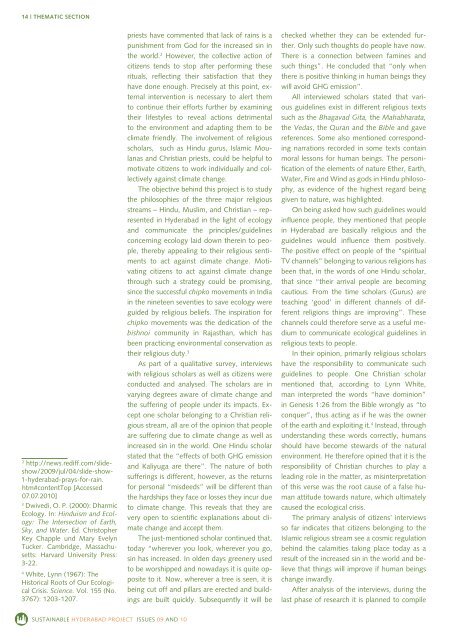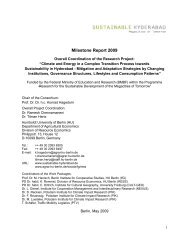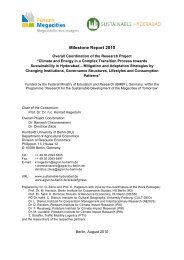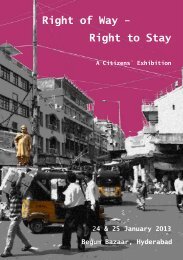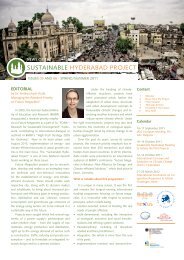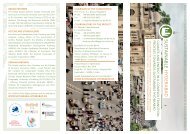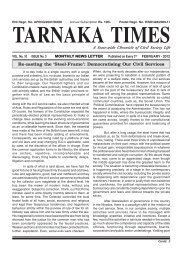SUSTAINABLE HYDERABAD PROJECT
SUSTAINABLE HYDERABAD PROJECT
SUSTAINABLE HYDERABAD PROJECT
Create successful ePaper yourself
Turn your PDF publications into a flip-book with our unique Google optimized e-Paper software.
14 | THEMATIC SECTION<br />
2<br />
http://news.rediff.com/slide-<br />
show/2009/jul/04/slide-show-<br />
1-hyderabad-prays-for-rain.<br />
htm#contentTop [Accessed<br />
07.07.2010]<br />
3<br />
Dwivedi, O. P. (2000): Dharmic<br />
Ecology. In: Hinduism and Ecology:<br />
The Intersection of Earth,<br />
Sky, and Water. Ed. Christopher<br />
Key Chapple und Mary Evelyn<br />
Tucker. Cambridge, Massachusetts:<br />
Harvard University Press:<br />
3-22.<br />
4<br />
White, Lynn (1967): The<br />
Historical Roots of Our Ecological<br />
Crisis. Science. Vol. 155 (No.<br />
3767): 1203-1207.<br />
priests have commented that lack of rains is a<br />
punishment from God for the increased sin in<br />
the world. 2 However, the collective action of<br />
citizens tends to stop after performing these<br />
rituals, reflecting their satisfaction that they<br />
have done enough. Precisely at this point, external<br />
intervention is necessary to alert them<br />
to continue their efforts further by examining<br />
their lifestyles to reveal actions detrimental<br />
to the environment and adapting them to be<br />
climate friendly. The involvement of religious<br />
scholars, such as Hindu gurus, Islamic Moulanas<br />
and Christian priests, could be helpful to<br />
motivate citizens to work individually and collectively<br />
against climate change.<br />
The objective behind this project is to study<br />
the philosophies of the three major religious<br />
streams – Hindu, Muslim, and Christian – represented<br />
in Hyderabad in the light of ecology<br />
and communicate the principles/guidelines<br />
concerning ecology laid down therein to people,<br />
thereby appealing to their religious sentiments<br />
to act against climate change. Motivating<br />
citizens to act against climate change<br />
through such a strategy could be promising,<br />
since the successful chipko movements in India<br />
in the nineteen seventies to save ecology were<br />
guided by religious beliefs. The inspiration for<br />
chipko movements was the dedication of the<br />
bishnoi community in Rajasthan, which has<br />
been practicing environmental conservation as<br />
their religious duty. 3<br />
As part of a qualitative survey, interviews<br />
with religious scholars as well as citizens were<br />
conducted and analysed. The scholars are in<br />
varying degrees aware of climate change and<br />
the suffering of people under its impacts. Except<br />
one scholar belonging to a Christian religious<br />
stream, all are of the opinion that people<br />
are suffering due to climate change as well as<br />
increased sin in the world. One Hindu scholar<br />
stated that the “effects of both GHG emission<br />
and Kaliyuga are there”. The nature of both<br />
sufferings is different, however, as the returns<br />
for personal “misdeeds” will be different than<br />
the hardships they face or losses they incur due<br />
to climate change. This reveals that they are<br />
very open to scientific explanations about climate<br />
change and accept them.<br />
The just-mentioned scholar continued that,<br />
today “wherever you look, wherever you go,<br />
sin has increased. In olden days greenery used<br />
to be worshipped and nowadays it is quite opposite<br />
to it. Now, wherever a tree is seen, it is<br />
being cut off and pillars are erected and buildings<br />
are built quickly. Subsequently it will be<br />
checked whether they can be extended further.<br />
Only such thoughts do people have now.<br />
There is a connection between famines and<br />
such things”. He concluded that “only when<br />
there is positive thinking in human beings they<br />
will avoid GHG emission”.<br />
All interviewed scholars stated that various<br />
guidelines exist in different religious texts<br />
such as the Bhagavad Gita, the Mahabharata,<br />
the Vedas, the Quran and the Bible and gave<br />
references. Some also mentioned corresponding<br />
narrations recorded in some texts contain<br />
moral lessons for human beings. The personification<br />
of the elements of nature Ether, Earth,<br />
Water, Fire and Wind as gods in Hindu philosophy,<br />
as evidence of the highest regard being<br />
given to nature, was highlighted.<br />
On being asked how such guidelines would<br />
influence people, they mentioned that people<br />
in Hyderabad are basically religious and the<br />
guidelines would influence them positively.<br />
The positive effect on people of the “spiritual<br />
TV channels” belonging to various religions has<br />
been that, in the words of one Hindu scholar,<br />
that since “their arrival people are becoming<br />
cautious. From the time scholars (Gurus) are<br />
teaching ‘good’ in different channels of different<br />
religions things are improving”. These<br />
channels could therefore serve as a useful medium<br />
to communicate ecological guidelines in<br />
religious texts to people.<br />
In their opinion, primarily religious scholars<br />
have the responsibility to communicate such<br />
guidelines to people. One Christian scholar<br />
mentioned that, according to Lynn White,<br />
man interpreted the words “have dominion”<br />
in Genesis 1:26 from the Bible wrongly as “to<br />
conquer”, thus acting as if he was the owner<br />
of the earth and exploiting it. 4 Instead, through<br />
understanding these words correctly, humans<br />
should have become stewards of the natural<br />
environment. He therefore opined that it is the<br />
responsibility of Christian churches to play a<br />
leading role in the matter, as misinterpretation<br />
of this verse was the root cause of a false human<br />
attitude towards nature, which ultimately<br />
caused the ecological crisis.<br />
The primary analysis of citizens’ interviews<br />
so far indicates that citizens belonging to the<br />
Islamic religious stream see a cosmic regulation<br />
behind the calamities taking place today as a<br />
result of the increased sin in the world and believe<br />
that things will improve if human beings<br />
change inwardly.<br />
After analysis of the interviews, during the<br />
last phase of research it is planned to compile<br />
<strong>SUSTAINABLE</strong> <strong>HYDERABAD</strong> <strong>PROJECT</strong> ISSUES 09 AND 10


